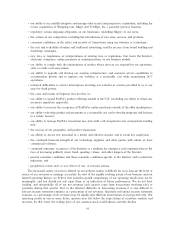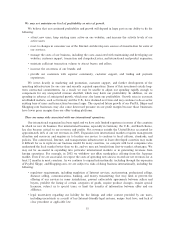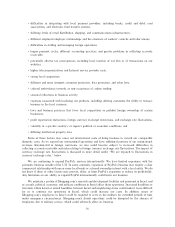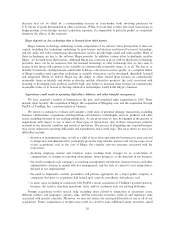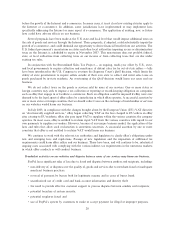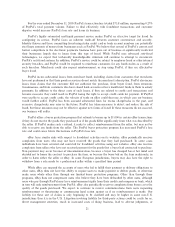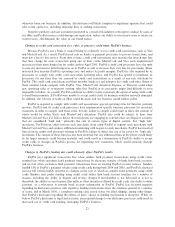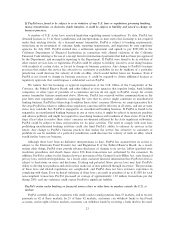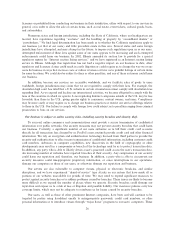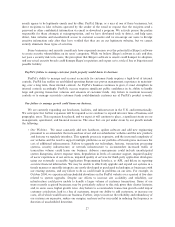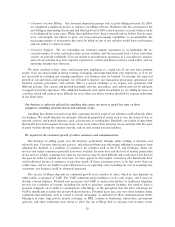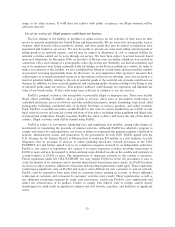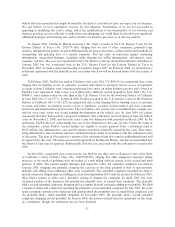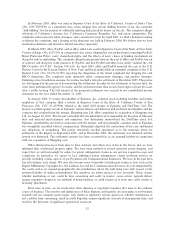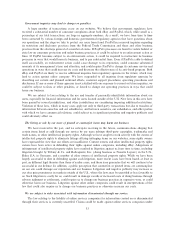eBay 2005 Annual Report Download - page 28
Download and view the complete annual report
Please find page 28 of the 2005 eBay annual report below. You can navigate through the pages in the report by either clicking on the pages listed below, or by using the keyword search tool below to find specific information within the annual report.PayPal offers customers the ability to send or receive payments denominated in U.S. dollars, British pounds,
Euros, Canadian dollars, Japanese yen, and Australian dollars. We act in cooperation with a local company in
the People's Republic of China, or PRC, which offers PRC residents the ability to send or receive payments
denominated in renminbi. 25 of the 55 markets whose residents can use the PayPal service are members of the
European Union, and PayPal provides localized versions of its service to customers in the EU through PayPal
(Europe) Ltd., a wholly-owned subsidiary of PayPal that is licensed in the United Kingdom to operate as an
Electronic Money Institution. PayPal (Europe) implements its localized services in EU countries through an
expedited ""passport'' notification process through the UK regulator to regulators in other EU member states,
pursuant to EU Directives. PayPal (Europe) has completed the ""passport'' notice process in all EU member
countries. The regulators in these countries could notify PayPal (Europe) of local consumer protection laws
that will apply to its business, in addition to UK consumer protection law. Any such responses from these
regulators could increase the cost of, or delay, PayPal's plans for expanding its business. PayPal (Europe) is
subject to significant fines or other enforcement action if it violates the disclosure, reporting, anti-money
laundering, capitalization, funds management or other requirements imposed on electronic money institutions.
In many markets outside of the U.S. and the European Union, it is not clear whether PayPal's U.S.-based
service is subject to local law or, if it is subject to local law, whether such local law requires a payment
processor like PayPal to be licensed as a bank or financial institution or otherwise. Even if PayPal is not
currently required to obtain a license in those countries, future localization or targeted marketing of PayPal's
service in those countries could require licensure and other laws of those countries (such as data protection
and anti-money laundering laws) may apply. If PayPal were found to be subject to and in violation of any
foreign laws or regulations, it could be subject to liability, forced to change its business practices or forced to
suspend providing services to customers in one or more countries. Alternatively, PayPal could be required to
obtain licenses or regulatory approvals that could impose a substantial cost on it and involve considerable delay
to the provision or development of its product. Delay or failure to receive such a license would require PayPal
to change its business practices or features in ways that would adversely affect PayPal's international
expansion plans and could require PayPal to suspend providing services to customers in one or more countries.
The current regulatory environment for Voice over Internet Protocol (VoIP) is unclear, and Skype's
business could be harmed by new regulations or the application of existing regulations to its products.
The current regulatory environment for VoIP is unclear. Skype's VoIP communications products are not
currently subject to all of the same regulations that apply to traditional telephony. VoIP companies are
generally subject to different regulatory regimes in different countries, and in some cases are subject to lower
regulatory fees and lesser regulatory requirements. Governments may impose increased fees, taxes, and
administrative burdens on VoIP companies. Increased fees could include interconnection fees and access
charges payable to local exchange carriers to carry and terminate traffic, contributions to the Universal Service
Fund in the United States and elsewhere, and other charges. New laws and regulations may require Skype to
meet various emergency service requirements, disability access requirements, consumer protection require-
ments, number assignment and portability requirements, and interception or wiretapping requirements, such
as the Communications Assistance for Law Enforcement Act. Such regulations could result in substantial
costs depending on the technical changes required to accommodate the requirements, and any increased costs
could erode Skype's pricing advantage over competing forms of communication. Regulations that decrease the
degree of privacy for users of Skype's products could also slow its adoption. The increasing growth of the VoIP
telephony market and popularity of VoIP telephony products heighten the risk that governments will seek to
regulate VoIP telephony and the Internet. Competitors, including the incumbent telephone companies, may
devote substantial lobbying efforts to seek greater protection for their existing businesses and increased
regulation of VoIP. In the United States, various state legislatures are considering legislation to impose their
own requirements and taxes on VoIP. Increased regulatory requirements on VoIP would increase Skype's
costs, and, as a result, our business would suffer.
Regulatory agencies may require Skype to conform to rules that are unsuitable for VoIP communications
technologies, that are difficult or impossible to comply with due to the nature of IP routing, or that are
unnecessary or unreasonable in light of the manner in which Skype's products are offered to customers. For
24


